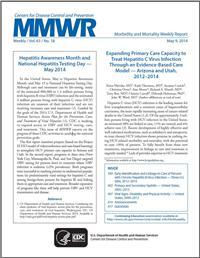Visit Website:
This report describes the CDC- funded programs beginning September 2012 in Utah and Arizona to improve access to primary care providers with the capacity to manage and treat HCV infection. The programs were modeled on the Extension for Community Healthcare Outcomes (Project ECHO) developed by the University of New Mexico’s Health Sciences Center in 2003 to build primary care capacity to treat disease among rural underserved populations through videoconferencing and case-based learning in “teleECHO” clinics. Process and Patient outcome data for each state program were analyzed to assess effectiveness of the programs in improving primary care provider capacity and increasing number of patients initiating treatment. Project ECHO was successfully implemented, and 66 primary care clinicians predominantly from rural settings were trained and a total of 129 patients seen in the clinics received antiviral treatment. Most of the clinicians (93 percent) had no prior experience in treating HCV infection.
Format:
Report
Publication Date:
2014
ID:
35768
- Health Planners
- Viral Hepatitis


